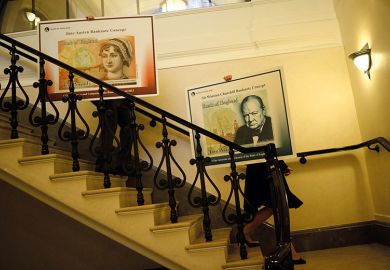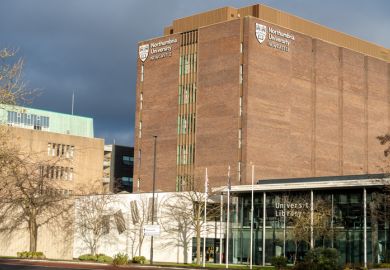The Universities Superannuation Scheme has launched an investigation into whether a trustee who turned whistleblower and raised concerns about the pension fund’s reported deficit breached its code of conduct.
Jane Hutton, a representative of the University and College Union on the USS board, told Times Higher Education that she had been sidelined after claiming that she had been obstructed in her bid to investigate an alleged error in the calculation of the scheme’s much-debated funding shortfall.
She said that she had not been given papers for the panel’s meeting on 20 June and that “I imagine if I turned up I would be removed”.
The row adds to the swirl of controversy surrounding USS, UK higher education’s biggest pension scheme, with about 200,000 active members. The deficit – now estimated to be about £3.6 billion – is at the heart of the fund’s proposals to increase contributions made by employers and university staff, which are being vigorously resisted by unions.
Earlier this month, the Financial Times reported that the fund had been rapped by the Pensions Regulator for using “incorrect” wording to describe the watchdog’s view of USS’ position on discount rates, which are used to value pension plans’ liabilities.
Professor Hutton, professor of statistics at the University of Warwick, told THE that she had recused herself from last month’s meeting of the USS board, which she described as a “kangaroo court”.
“They brought in an external lawyer to the board meeting. Some non-executive directors tried to say directors are not allowed to whistleblow which is simply not true – the USS whistleblowers policy covers directors,” she said.
“USS has employed lawyers for an ‘independent’ investigation of alleged breaches of the directors’ code of conduct; they are trying to say that whistle-blowing isn’t allowed.”
Professor Hutton said that USS’ behaviour was “extremely stressful” and “extremely frustrating”. Her concerns about the deficit focused on an apparent error in the fund’s “retirement rate”, which wrongly assumed members were retiring earlier than they did in reality and hence inflated pension costs.
“My job is to use the skills that I have. I was appointed as an expert statistician, I am internationally recognised as such and I am basically not being allowed to exercise those skills,” Professor Hutton said.
“It seems they want experts who do what they're told, not experts who actually try to do their fiduciary duty for the members and other stakeholders. It’s my job to question. Every time I ask questions, I get refused answers. Obviously I am going to carry on asking questions.”
Jo Grady, UCU’s general secretary-elect, said that Bill Galvin, USS’ chief executive, and Sir David Eastwood, its chair, should resign.
Dr Grady told THE that, in light of recent revelations, it was difficult to “see how anybody is to have any confidence or faith” in the USS board’s conduct.
“It’s difficult to imagine how we can proceed to negotiate any settlement over USS with Bill Galvin still in place, and if I was David Eastwood I would be considering my position as well,” Dr Grady said.
She added that Universities UK, which represents employers in the pension negotiations, should join the call for Mr Galvin to quit.
A UUK spokesman said that an expression of no confidence in the USS board or executive “would be an irresponsible move”.
“It would delay the 2018 valuation, likely lead to regulatory intervention, and would result in higher contributions increases in October 2019 and April 2020, to the detriment of employers and scheme members,” the spokesman said.
A USS spokesman said: “Our primary duty is to pay the pensions of our members as they fall due and that remains our focus.”
Register to continue
Why register?
- Registration is free and only takes a moment
- Once registered, you can read 3 articles a month
- Sign up for our newsletter
Subscribe
Or subscribe for unlimited access to:
- Unlimited access to news, views, insights & reviews
- Digital editions
- Digital access to THE’s university and college rankings analysis
Already registered or a current subscriber?








